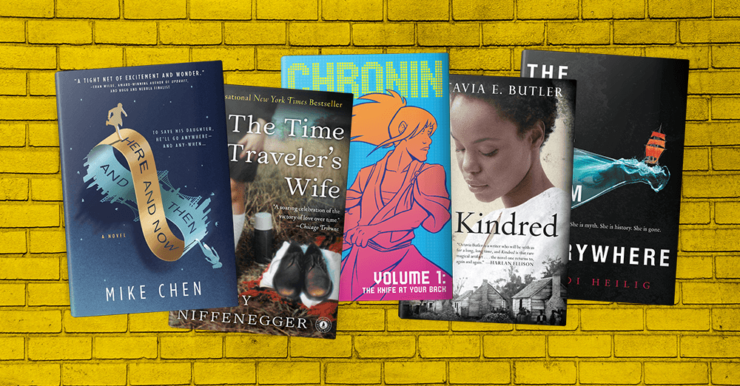Time travel has long been considered science fiction, while appearing in both science fiction and fantasy. The truth is, time travel’s grandfather paradoxes, forking plotlines, and shiny, spinning parts—from Hermoine’s Time Turner, to H.G. Wells’ time machine, to wormholes (thank you, Sliders)—grace both genres, posing inevitable challenges to our understanding of the narrative arc.
Meantime, portal narratives are often considered fantasy, and so-named because they send their characters to another location—often a secondary world (like Narnia). But one could, if one were so inclined, argue that the fourth dimension—time—is also a valid option for transit between different places.
With this consideration, time travel and portal narratives are at least related, sharing characteristics like being transported, and returned, to a different dimension or world.
Here are a few books that explore the paradoxical relationship of time travel and portal narrative:
Kindred — Octavia Butler
A difficult, breathtaking work. Kindred’s main character, Dana, is pulled backwards in time and across the country in space, to save someone. During repeated travel between time and place, Dana comes face to face with the horrors of slavery in pre-Civil-War Maryland, and, simultaneously, Butler’s readers face layers of painful history. In many ways, it the novel that is the portal, as much as Dana’s past and present.
Buy the Book
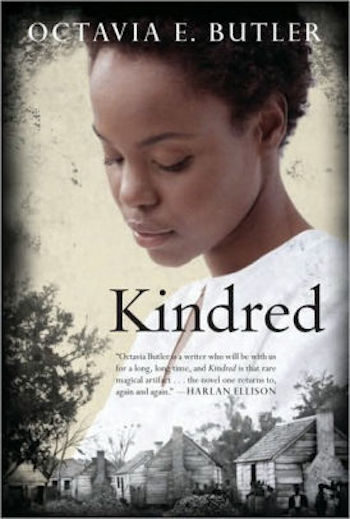

Kindred
The Girl from Everywhere — Heidi Heilig
On board The Temptation—a magical ship that can go anywhere, and anywhen, as long as there’s a map—Nix has traveled with her father all over the world, and beyond it. This is a true multi-portal story, where The Temptation is the transit point, and a true time-travel story, with choices to be made about who remains on which timeline.
Buy the Book
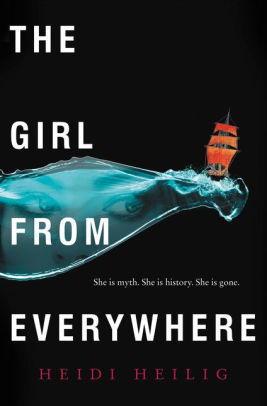

The Girl From Everywhere
Here and Now and Then — Mike Chen
To save his daughter, Miranda, Kin Stewart must reconnect with his past—which is in the future—a future that wants him back above all costs. Mike Chen’s intrigue-filled time-travel debut is a fairly straightforward fourth-dimension portal narrative, where the danger lies in what gets lost between the world of the future and the world of the present.
Buy the Book
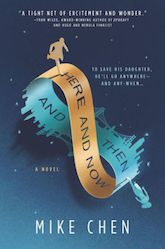

Here And Now And Then
Chronin — Alison Wilgus
In this graphic novel, Mirai Yoshida is a student of the past in 2042’s New York City. Using a time-machine, she and her classmates travel back to Japan, circa 1864, and then must figure out how to get back. Here, time-travel is done with science-fictional supports: long hours of study and complicated technology. But a quirk of time-travel fiction—the impact of changing the past—is also a feature of portal narratives… quite often traveling to one place and changing or learning things there will impact the world one has traveled from. Or, perhaps not learning, depending on the intent of the characters.
Buy the Book
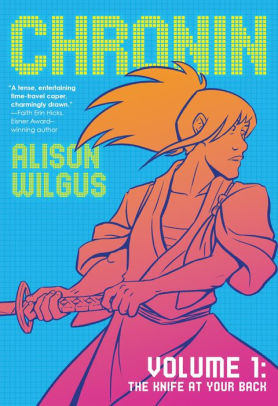

Chronin
The Time Traveler’s Wife — Audrey Niffenegger
The Time Traveler’s Wife is an interesting play on the time travel as portal narrative theory. Niffenegger’s novel reveals much about what life is like for those close to portal narrative characters. The ones who aren’t taking the trip to another dimension. Claire, the titular character, stays in a single timeline, while her—well Henry’s a LOT of things—is deposited in different times by a genetic disorder.
Buy the Book
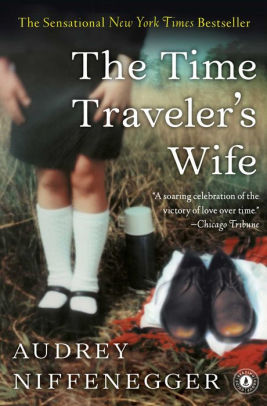

The Time Traveler's Wife
Avengers: Endgame
Dr. Strange and the Masters of the Mystic Arts can open interdimensional portals to other places, while [spoilers] can maybe do similar things with another dimension and that’s all we’re going to say about that. But basically it’s all linked and totally related. If you’ve seen it, you know. If not, just trust me.
Not mentioned, but so you won’t yell in the comments: Madeleine L’Engle’s Wrinkle in Time series, Connie Willis’ Oxford Time Travel series.
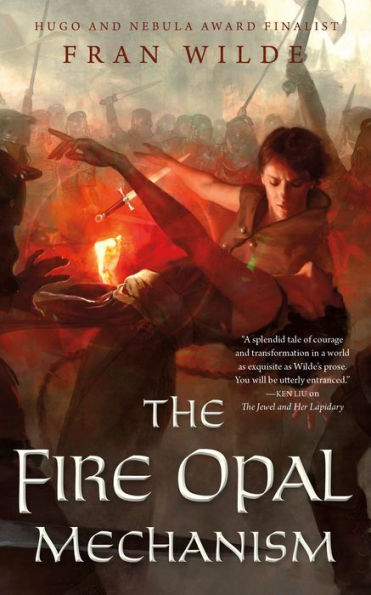 Fran Wilde’s latest Gem Universe novella, The Fire Opal Mechanism (coming June 4, 2019 from Tor.com Publishing), features time-traveling librarians and thieves. Her novels and short stories have been finalists for four Nebula Awards, a World Fantasy Award, and two Hugo Awards, and include her Nebula- and Compton-Crook-winning debut novel Updraft, its sequels Cloudbound, and Horizon, her 2019 debut Middle Grade novel Riverland, and the Nebula-, Hugo-, and Locus-nominated novelette The Jewel and Her Lapidary. Her short stories appear in Asimov’s, Tor.com, Beneath Ceaseless Skies, Shimmer, Nature, and the 2017 Year’s Best Dark Fantasy and Horror. She writes for publications including The Washington Post, Tor.com, Clarkesworld, iO9.com, and GeekMom.com. You can find her on Twitter, Facebook, and at franwilde.net. Fran will become Director of Genre Writing at Western Colorado University’s Graduate School of Creative Writing this summer.
Fran Wilde’s latest Gem Universe novella, The Fire Opal Mechanism (coming June 4, 2019 from Tor.com Publishing), features time-traveling librarians and thieves. Her novels and short stories have been finalists for four Nebula Awards, a World Fantasy Award, and two Hugo Awards, and include her Nebula- and Compton-Crook-winning debut novel Updraft, its sequels Cloudbound, and Horizon, her 2019 debut Middle Grade novel Riverland, and the Nebula-, Hugo-, and Locus-nominated novelette The Jewel and Her Lapidary. Her short stories appear in Asimov’s, Tor.com, Beneath Ceaseless Skies, Shimmer, Nature, and the 2017 Year’s Best Dark Fantasy and Horror. She writes for publications including The Washington Post, Tor.com, Clarkesworld, iO9.com, and GeekMom.com. You can find her on Twitter, Facebook, and at franwilde.net. Fran will become Director of Genre Writing at Western Colorado University’s Graduate School of Creative Writing this summer.










